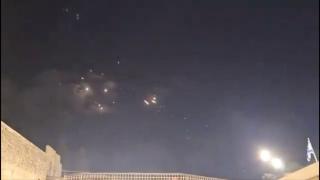U.S. Joins Israel in Hot Warfare; Stop the World War Party Before It’s Too Late
By Marcia Merry BakerOct. 1, 2024 (EIRNS)—As of today, the United States is involved in hot warfare in Southwest Asia—not readiness, not contingency, but engagement. At nightfall today, local time, some 180-200 ballistic missiles were fired from Iran to Israel, in retaliation, according to the Tehran statement today, for Israel’s Sept. 27 assassination of Hassan Nasrallah, leader of the Hezbollah, and other named leaders. Two U.S. destroyers, the USS Cole and the USS Bulkeley, fired 12 interceptors back at the missiles, joining in the Israeli defense.
The U.S. will continue to defend Israel, stated top White House and Pentagon officials after the episode, saying they await what Israel’s next decision will be. As of the time of preparation of this bulletin, the Israeli Security Council was meeting to decide on their next move. At the United Nations this afternoon, Israeli Ambassador to the UN Danny Danon briefed media to be prepared for Israel’s next actions, from which “Iran will feel the consequences.” He said, “It will be noticed. It will be painful.”
White House spokesman Jake Sullivan, the National Security Advisor, said that there are “deep consultations” going on. “Biden ordered the U.S. to help defend Israel.” Pentagon spokesman Air Force Maj. Gen. Pat Ryder reiterated, “We fully support Israel’s right to defend itself.” He played down what Israel is doing on Lebanon, saying that, “Israel is destroying limited Hezbollah infrastructure on the border.”
A mad chorus of U.S. political voices—in unison across party lines—is cheering Israel on for its bombings and assassinations, and extolling U.S. support. Vice President Kamala Harris said of Israel’s killing of Nasrallah that “I have unwavering commitment to the security of Israel. I will always support Israel’s right to defend itself against Iran, and Iran-backed terrorist groups such as Hezbollah, Hamas, and the Houthis.” Jared Kushner, Trump’s son-in-law, and advisor to Trump’s Presidency on Southwest Asia, said on Sept. 29 that the day of Nasrallah’s death was “the most important day in the Middle East since the Abraham Accords breakthrough,” referring to the anti-Palestinian mock “peace plan” that he himself had promoted.
The damage from today’s missile attack, according to preliminary reports, may be limited, it is to be hoped. But the escalation dynamic in play is beyond dangerous. The U.S. has pre-positioned extensive fire power and forces in the region. The Department of Defense yesterday released a statement, “DOD Enhances Middle East Defense Posture,” which details the additional aircraft and personnel expedited to Southwest Asia, for “various contingencies,” and “to come to the aid of Israel.”
Britain is conspicuous in the diplomatic consultations, along with the U.S. and Israel. Defense Secretary Lloyd Austin, who spoke twice today with Israeli Defense Minister Yoav Gallant, conferred with British Defense Secretary John Healey yesterday. The polite U.S. readout said that Austin and Healey “noted ongoing coordination between the United States and United Kingdom to protect both U.S. and U.K. personnel in the region and committed to continued close communication as the situation unfolds.” For months, even years, the demonization of Iran has been gospel for these deadly geopolitical circles.
Leaders in the region, and the world Arab and Muslim communities have mobilized over the past two days, since the bombing-murder of Hassan Nasrallah, and the Israeli buildup for ground forces against Lebanon, calling for emergency action. Iraq yesterday requested a meeting of the Arab League, whose Secretary-General Ahmed Aboul-Gheit issued a statement of support for Lebanon. The Gulf Cooperation Council yesterday called for an immediate ceasefire in Lebanon. Iran called for an emergency meeting of the Organization of Islamic Cooperation, on the day of the Nasrallah murder, Sept. 27.
What happens next? Join the mobilization to stop the madness. Take the next opportunity to confer with others internationally on what we can do. Wednesday, Oct. 2, the Schiller Institute hosts an international web event, “Another Step Closer to Nuclear Armageddon—Germany Needs a New Security Architecture.”
On Thursday, Oct. 3, there will be an international event, in-person and online, based in Peru. In both English and Spanish, the conference is titled, “Development Strategies and Mechanisms for Cooperation in the Multipolar World.”
Friday, Oct. 4, will be the 70th consecutive weekly meeting of the International Peace Coalition.






